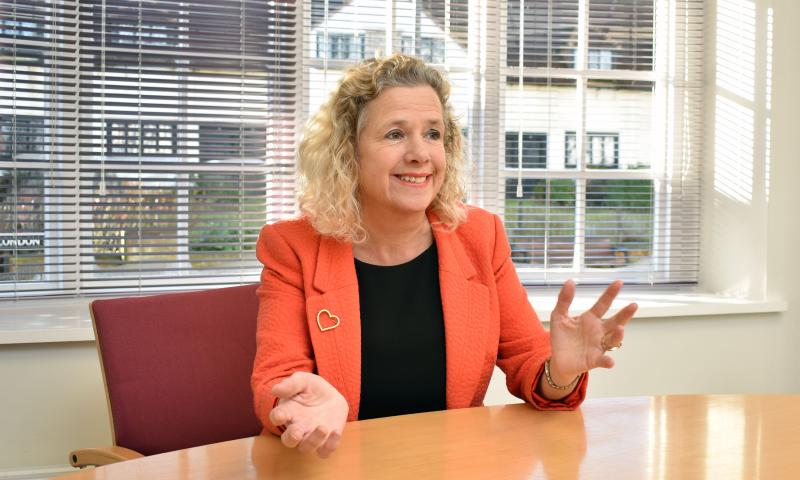
21 April 2020
Family Mediation can be one of the most sensible and cost-effective ways of resolving problems when a relationship has broken down. At Phillips Solicitors, incorporating Brain Chase Coles, we offer this service through a part of our business called Haymarket Family Mediation. Headed up by Sheila Parkes, the team specialises in helping couples resolve disputes by negotiation and mediation.
If you go to mediation, do they try to persuade you to stay together or to get back together again, if you have already split up?
No. The aim of mediation is not to try to stop couples splitting up. It is to help both partners work out decisions and arrangements for the future that they both accept. Usually this is at a stage where one partner has already left or where one or both partners see a need for separation. If, however, both partners want to consider staying together, the mediator would usually encourage them to go to Relate or to a similar counselling service. Most couples who come to mediation are facing a separation or divorce and want to avoid a long and bitter battle that ends up in court or they may need assistance in dealing with potential changes to arrangements already in place.
Is mediation likely to help and, if so, in what way?
- Mediation helps couples to work out agreements and avoid fighting each other in court
- It helps parents co-operate over the children and discuss children’s needs and concerns
- It helps both parties to understand their financial position, by piecing together all the details and necessary documents and then working out the possible terms of a financial settlement based on each party’s circumstances and needs
- Mediators can give a great deal of information about the legal process of divorce and the general principles the court follows in making orders in divorce.
- Mediation is likely to reduce legal costs, possibly a great deal. It should cost considerably less to work out the terms of an agreement with a mediator, compared with paying two solicitors – one on each side – to negotiate for you or take your case to court. Legal aid for mediation is completely free at the moment, whereas there is very limited legal aid if you have to go to court and even then, you may end up having to pay back part of your legal costs, if you are liable for what is known as “the statutory charge”.
- Mediation helps those taking part to reach joint decisions, instead of asking a judge to decide for them. It often helps them come up with ideas and solutions that neither of them had thought of before. The mediator does not make decisions but can offer suggestions. People are not put under pressure to agree to something against their will. They are in control.
- The mediator also keeps discussions on track and helps to make the atmosphere as civilised and constructive as possible. The discussions are informal and each party has an equal opportunity to explain priorities and concerns.
Is mediation confidential?
Yes, all the discussions that take place in mediation are confidential. The mediator does not give information to any third party without both parties’ written consent. Three exceptions would be:-
- Where a child or other person was said or thought to be at risk of serious harm – and even then, any action to be taken by the mediator in contacting social services or police would normally be discussed first in the mediation session.
- Where one client is eligible for legal aid, as if so the Legal Aid Agency can request the file to check on the eligibility assessment carried out for that client
- If there are any issues around money laundering, the mediator would need to follow certain specific rules which could include reporting concerns to the appropriate body.
Can one party tell the court what the other one said in mediation?
No. The discussions that take place in mediation are legally privileged, meaning that neither party can tell the court what was said in mediation unless both parties agree to do so (except, as explained above, where there are concerns about a child at risk). The financial information provided by both parties and considered jointly in mediation can, however, be made available to the court, as this may be necessary for a consent order. It also saves the information being collected all over again by solicitors, so that you do not go back to square one when the mediation comes to an end without any basis for agreement.
How long does mediation usually take?
On average, four sessions but it can be less or more dependent on the circumstances of the case. It depends on whether there is some agreement already, whether the issues are about children and/or finances and on whether the financial position is relatively straightforward or more complicated. Each meeting with the mediator normally lasts an hour and a half. If there are financial matters to deal with, it is rarely possible to go through everything in fewer than three meetings. However it is up to each party to decide at the end of each meeting whether they feel they are making headway and want another meeting. It is still a lot quicker than going to court.
Who are the mediators? Are they trained?
The mediators providing this service have had special training in mediation and they may also be qualified and experienced family lawyers. Mediation on all the questions that arise in separation and divorce – children, maintenance, property, pensions and so on – need up-to-date knowledge and experience of the law and the legal system. The law in certain areas – pensions, for example – is constantly changing. There may also be a need to seek advice from other experts, such as accountants, financial advisors, counsellors or debt agencies but the mediator can often help by clarifying the exact questions that need to be asked and signpost to appropriate services.
Are the people who go to mediation satisfied with the results they get?
A research study carried out by Newcastle University found that 80% of couples reached some agreement and most were satisfied with their agreements. Mediation made communication easier and the separation or divorce was then less bitter and stressful. Those who saw mediators with a family law background appreciated their legal expertise and those with a therapeutic background as having that expertise. Two-thirds of mediation clients thought mediation had reduced their legal costs. Most felt it had helped them to co-operate as parents where their children were concerned. Even when there was a high level of conflict and women, in particular, had been doubtful about taking part, most said it enabled them to talk and have their point of view heard in a way that would not otherwise have been possible.
If people go back to their solicitors after making good progress in mediation, is there a risk that the solicitors will take their proposed agreement apart, so that both parties end up fighting in court after all?
Research findings show that solicitors who specialise in family law, support mediation and do not set out to undermine the progress their clients have made in mediation. The general experience is that solicitors normally advise their clients to accept the mediated settlement, provided the mediation has been conducted properly by a well trained and experienced family mediator and that all the necessary information has been provided for both parties.
Each party should check the terms and consequences of a proposed agreement reached in mediation with an independent legal adviser, so that neither of them enters into a legally binding agreement without understanding its implications and/or without having obtained legal advice on its contents.
Mediators help people to make the best possible use of their legal advisers, so that following mediation a legally binding agreement can be drawn up at minimum cost.
If legal advisors should recommend taking the case to court, each party should consider very carefully the legal costs and delay that would be involved and the emotional stress of going to court. The mediator can help both parties to identify the questions they need to ask their lawyers, such as how much the legal proceedings could cost, how long they might take and whether they could end up with a worse deal than the terms worked out in mediation.
Can my children have a say?
Yes. Depending on how old your children are and providing they agree, along with both parents, the mediator can arrange to spend some time talking with your children via a range of video conferencing platforms. Their meeting with the mediator will be confidential.
Can mediation take place remotely?
Yes – as a service we have been offering this option for some time but due to current social distancing guidelines, Sheila and her team currently host all mediation sessions via various video conferencing platforms including Skype, Zoom, Microsoft Teams and 3CX web conferencing. There is no written rule requiring mediation to take place in person and this option therefore prevents any delay in progressing cases. For some parties, this can actually be more convenient and a more palatable option for dealing with particularly sensitive issues or where parties would struggle to sit in the same room as each other.
Should you wish to discuss family mediation, please don’t hesitate to get in touch with Sheila on 01256 854652 or by emailing [email protected]
During these difficult times our Town Gate office in Basingstoke is temporarily closed to visitors unless by prior appointment and when meeting in person is essential. However, thanks to our lawyers being able to work remotely, Phillips and Haymarket Family Mediation remain fully open for business and can discuss mediation or any other legal matters by telephone and video conference.
Disclaimer
This article is current at the date of publication set out above and is for reference purposes only. It does not constitute legal advice and should not be relied on as such. Specific legal advice about your specific circumstances should always be sought separately before taking any action.
Please call us or email and we’ll get back to you as soon as possible.

The Annual Allowance With the end of the current tax year fast approaching, anyone wishing to use their 2023/24 (and potentially their 2022/2023) annual allowance in relation to gifts o ...
More
This week (4 – 8 March) is Update your Will Week Phillips Law is encouraging people to consider the risks of not having a Will following new research revealing nearly half of UK adults ...
More
Phillips Law is delighted to have advised Mactaggart Family & Partners and Longstock Capital Limited on a multi-million-pound agreement for lease with The AA to move their headquart ...
More
In our January update we reported on the Supreme Court decision in the long running dispute between Deliveroo and the unions representing many of its riders. You can read the full Judgm ...
More
From 6 April 2024 carers will have a day one right to request one week’s unpaid carer’s leave per year. Draft regulations for the Carer’s Leave Act 2023 provide the detail on this new r ...
More
Welcome to the new year! As we embark on 2024, it’s crucial to stay informed about the latest developments in employment law. Here’s a snapshot of key updates and changes th ...
More